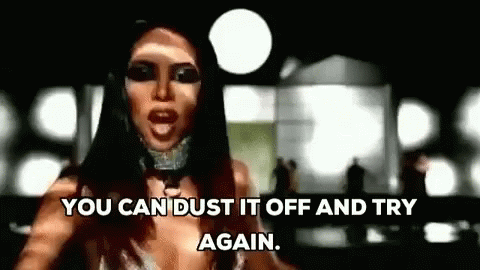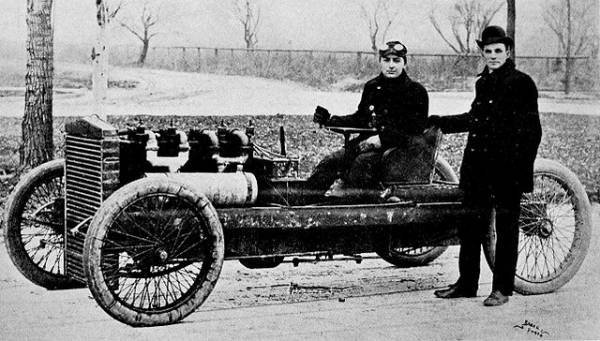Learn From Failure in Order to Succeed

I think Aaliyah said it best,
"And if at first, you don't succeed (first you don't succeed)
Then dust yourself off and try again."
Lyrics from Aaliyah's famous song, "Try Again."
Nobody aims to fail. Failure typically brings feelings of disappointment, frustration, and a sense of inadequacy. While these emotions are valid, they don't define your worth. You are only a failure when you give up. The truth is, behind every great achievement lies a trail of failures. In this blog, we explore why failure is not just inevitable but essential on the path to success.

Welcome to Anything About Everything!
Hey there!
Thank you for visiting my blog, Anything About Everything, also known as AAE. If you are new here, I hope AAE becomes your new favorite site to get movie recommendations, productivity tips, and more. If you were looking for where you could subscribe, don't worry, I've got you covered. Click right here to join the AAE community.
To the AAE family members, welcome. You all already know you're in for a treat. Thank you for your continuous support; you are greatly appreciated.
Without further delay, let's explore why failure is indispensable on your path to success.
Understanding Failure:
Failure is often seen as the antithesis of success, but it's more accurately a crucial component of it. It's through failure that we learn, grow, and ultimately triumph.
Let's take a look at a few examples of fails that led to success stories:
Steven Sasson's Story- The Camera
In this blog post by the National Science and Technology Medals Foundation, I learned about this man named Steven Sasson, whose goal throughout the '70s and the '80s was to create the first functional digital camera. Spoiler alert: he did; he won an award for his invention in 2009.
The quote that stood out to me the most was this:
"What does it take to be good at failure? Curiosity"
Failure is disappointing, but he didn't view it that way. Sasson was driven more by learning more about where he misstepped in his process. His understanding of how a camera should and shouldn't work began to grow through failure.
You can read all about his magnificent journey in the blog post below.

Michael Jordan- The Basketball Master
Everyone knows Michael Jordan; he's practically basketball royalty. Jordan's dedication and contribution to the game of basketball is acknowledged and respected. Jordan is arguably the best NBA player, retired or currently playing. What people don't understand is that MJ didn't start that way.
Michael Jordan often talks about losing to his older brother when he was younger. Constantly losing to his brother Larry made Jordan work twice as hard, and that helped him become the great player we know and admire. You can learn more about MJ's humble beginnings at Basketball Network.
Even at the height of his career, Michael Jordan has still failed. Read these quotes below:
“I’VE MISSED MORE THAN 9,000 SHOTS IN MY CAREER. I’VE LOST ALMOST 300 GAMES. 26 TIMES, I’VE BEEN TRUSTED TO TAKE THE GAME-WINNING SHOT AND MISSED. I’VE FAILED OVER AND OVER AND OVER AGAIN IN MY LIFE. AND THAT IS WHY I SUCCEED.”
– Michael Jordan
“IF YOU’RE TRYING TO ACHIEVE, THERE WILL BE ROADBLOCKS. I’VE HAD THEM; EVERYBODY HAS HAD THEM. BUT OBSTACLES DON’T HAVE TO STOP YOU. IF YOU RUN INTO A WALL, DON’T TURN AROUND AND GIVE UP. FIGURE OUT HOW TO CLIMB IT, GO THROUGH IT, OR WORK AROUND IT.”
– Michael Jordan
I got these MJ quotes thanks to Manlyzine on Medium.
So many people are quick to acknowledge Jordan on his wins, and they should, but people don't appreciate the failures that led up to that win. A lot of repetitive practice helped Jordan perfect his craft; even then, he wasn't perfect. He got better by accepting failure and learning from his mistakes.
Modern Medicine & Other Scientific Breakthroughs
The reason why modern medicine has made such progress is because of trial and error. Something as simple as the scientific method, something most of us learned in grade school, has been the leading factor in helping mankind achieve so much progress.
Changing our thinking by reasoning like a scientist, collecting data, asking the right questions, and learning from failed experiments has propelled modern medicine tremendously. The same can be said for cars, clothes, houses, etc.
A good example would be Ford. Henry Ford's journey from failure to success was characterized by perseverance, innovation, and a willingness to learn from setbacks. His ability to turn failures into opportunities for growth and innovation contributed significantly to his enduring legacy in the automotive industry and beyond.

Benefits of Failure:
Although failure has a few negative connotations, it does bring several benefits that contribute to personal growth, resilience, and eventual success. Here are some key benefits of failure:
- An educative experience: Failing forces you to evaluate what went wrong, what you could have done differently, and how to improve later.
- Builds resilience: Failing is the embodiment of tough love. Failure might be the hardest lesson teacher you'll ever encounter. You'll learn how to bounce back from setbacks, face adversity, and persevere through difficulties. You will come to understand that there is growth in resistance.
- Fosters creativity: Failure pushes us out of our comfort zone. When placed in uncomfortable positions, we start to get creative with our thinking. Failure forces you to explore new ideas. We start looking at solutions that would have otherwise not been considered.
- Character development: Patience, humility, persistence, and self-discipline are all characteristics fostered when one overcomes failure.
- Clarification: Failure can prompt introspection and clarify your goals, values, and priorities.
- Overcoming fear: Facing failure head-on reduces the fear associated with it. It teaches you that failure is survivable and not the end of the road, thereby empowering you to take more calculated risks in the future.
Future prospects: How you handle failure can build trust and respect among peers, colleagues, and team members. It demonstrates authenticity, vulnerability, and the ability to learn and grow.
Strategies for Embracing Failure:
Shift your mindset, reflect on setbacks, and persist in the face of adversity. These strategies can turn failure from a stumbling block into a stepping stone.
- Focus on learning: Shift your focus from the outcome of failure to the lessons you can extract from it. Ask yourself what you can learn from the experience, how it can inform your decisions moving forward, and what adjustments you can make to improve.
- Self-reflection: Take time to introspect and analyze the reasons behind the failure. Reflect on the decisions made, actions taken, and external factors that may have contributed to the outcome.
- Keep a Journal: Document your experiences with failure, including your thoughts, emotions, and the insights gained. Referencing these entries can provide clarity and perspective over time.
- Celebrate Small Wins: Recognize and celebrate small achievements and milestones along the way, even if they are not the ultimate success you initially aimed for. Acknowledging progress can help maintain motivation and resilience.
- Support Network: Surround yourself with a supportive network of individuals who encourage personal growth and provide constructive feedback. Lean on this network during times of failure to gain perspective and encouragement.
By implementing these strategies, you can cultivate a proactive and resilient approach to embracing failure. Remember that setbacks are opportunities for learning and growth, and they can ultimately pave the way toward achieving your goals and aspirations.
Last Points
In conclusion, embracing failure is not merely about overcoming obstacles; it's about transforming setbacks into stepping stones for personal and professional growth. By shifting our mindset to see failure as a natural part of the learning process, reflecting deeply on the lessons it teaches us, and persisting with resilience in the face of adversity, we empower ourselves to achieve greater success. Every failure offers an opportunity to refine our strategies, strengthen our resolve, and ultimately move closer to our goals. As we navigate our journeys, let us embrace failure not as a deterrent but as a catalyst for innovation, resilience, and continuous improvement.
Thank You For Reading!
I want to extend a heartfelt thank you to each and every one of you who took the time to read this blog post. Your engagement and support mean the world to me. I hope you found these insights valuable and applicable to your own experiences. Please feel free to share your thoughts in the comments below—I always appreciate hearing from you. Thank you again for being part of this journey with me!





Comments ()